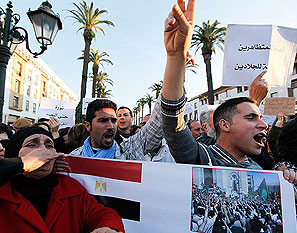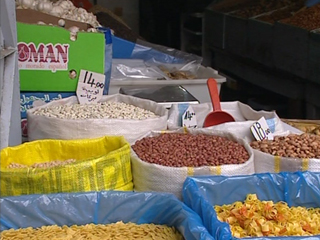Morocco waits expectantly .- morning holding the first call for protests in major cities after the outbreak of revolts in Arab countries, on a day that organizers have dubbed Day of Dignity. While political parties and the media almost unanimously sent the message that the Moroccan case is different from other Arab countries, the young organizers of the protest through Facebook, the Movement February 20, insist that their country needs now "a democratic constitution." Until now, the internet has been the main battleground between supporters of a profound constitutional reform and those advocating a monarchy executive, as the present, while alert to the risks of instability.
Sabotage in Facebook groups have been common until the last moment, as denounced Osama el Jlifi, creator of one of the pages that call for mobilization. Facing the Movement February 20 other groups have proliferated in social networks as "Do not touch my king", which is defended with all sorts of arguments the "status quo" of Morocco.
The official Morocco has recognized the right to demonstrations, especially if they are social, but has cast doubt on the organizers of the protests, especially after the outlawed Islamist movement Al Adl wal Ihsan (Justice and Charity) announced that it will participate. The nationalist party Istiqlal, the Moroccan Prime Minister Abbas El Fassi, was now responsible to the organizers of the protests of "the impact of unwelcome" and rejected the statements "that do not adapt to democratic practice," according to a statement released by official agency MAP.
For his part, Minister of Economy and Finance and leader of the National Association of Independents (RNI), Salahedin Mezuar, Morocco warned that he risks "losing in weeks what we have achieved in the last ten years," and warned of the dangers for investment, in a meeting with young party.
Only a single figure, such as Industry Minister, Ahmed Reda Chami, of the Socialist Union of Popular Forces, showed a slightly more ambiguous. In his Facebook page, Chami said that "manifest their ideas is a fundamental right," adding that "Morocco is still need to finalize the political, economic and social." The protests are supported by a dozen NGOs (including the influential Moroccan Human Rights Association), three leftist parties, the Islamist Justice and Charity, and have been supported, inter alia, a list that includes many of the most militant and independent journalists in the country.
Although the streets of Rabat had a normal day, some Moroccan cities met last night for isolated incidents, as in Tangier (north), where hundreds of protesters in the center of the city against high prices of electricity and water . After the demonstration, a group of these youths attacked with stones the façade of the principal of the second district police station in the suburb of Al Auama in that city, according to Efe reported to local authorities.
The protesters also burned part AMENDIS agency, France's Moroccan subsidiary Veolia, which is responsible for the distribution of water and electricity in Tangier, and the branch of a bank. Protests also took place last night at Asylum (north) against the mayor, Mohamed Benaissa, in Laayoune, Western Sahara's administrative capital, where Sahrawi sources said there were clashes between pro-independence youth groups and police. 


Sabotage in Facebook groups have been common until the last moment, as denounced Osama el Jlifi, creator of one of the pages that call for mobilization. Facing the Movement February 20 other groups have proliferated in social networks as "Do not touch my king", which is defended with all sorts of arguments the "status quo" of Morocco.
The official Morocco has recognized the right to demonstrations, especially if they are social, but has cast doubt on the organizers of the protests, especially after the outlawed Islamist movement Al Adl wal Ihsan (Justice and Charity) announced that it will participate. The nationalist party Istiqlal, the Moroccan Prime Minister Abbas El Fassi, was now responsible to the organizers of the protests of "the impact of unwelcome" and rejected the statements "that do not adapt to democratic practice," according to a statement released by official agency MAP.
For his part, Minister of Economy and Finance and leader of the National Association of Independents (RNI), Salahedin Mezuar, Morocco warned that he risks "losing in weeks what we have achieved in the last ten years," and warned of the dangers for investment, in a meeting with young party.
Only a single figure, such as Industry Minister, Ahmed Reda Chami, of the Socialist Union of Popular Forces, showed a slightly more ambiguous. In his Facebook page, Chami said that "manifest their ideas is a fundamental right," adding that "Morocco is still need to finalize the political, economic and social." The protests are supported by a dozen NGOs (including the influential Moroccan Human Rights Association), three leftist parties, the Islamist Justice and Charity, and have been supported, inter alia, a list that includes many of the most militant and independent journalists in the country.
Although the streets of Rabat had a normal day, some Moroccan cities met last night for isolated incidents, as in Tangier (north), where hundreds of protesters in the center of the city against high prices of electricity and water . After the demonstration, a group of these youths attacked with stones the façade of the principal of the second district police station in the suburb of Al Auama in that city, according to Efe reported to local authorities.
The protesters also burned part AMENDIS agency, France's Moroccan subsidiary Veolia, which is responsible for the distribution of water and electricity in Tangier, and the branch of a bank. Protests also took place last night at Asylum (north) against the mayor, Mohamed Benaissa, in Laayoune, Western Sahara's administrative capital, where Sahrawi sources said there were clashes between pro-independence youth groups and police.



- Duo Esfuerzo Del Mañana Group : Guatemala (07/02/2011)
- Loughner and Corilles: Two Terrorists, One U.S. Double Standard: La Jornada, Mexico (24/01/2011)
- Telefutura Announces New Afternoons With "Las Nuevas Tardes de TeleFutura" & "Mañana es Para Siempre" (20/01/2011)
- Watch TV : Watch Real Madrid vs Levante Live match TV Online on Sky Sports TV Channel Live Free TV Streaming on February 19 2011 Spain - Primera Division. (19/02/2011)
- Mexican Primera Division, 2011 Clausura, Round 7: UANL Tigres And Monterrey Contest Clasico Regiomontano (19/02/2011)
No comments:
Post a Comment